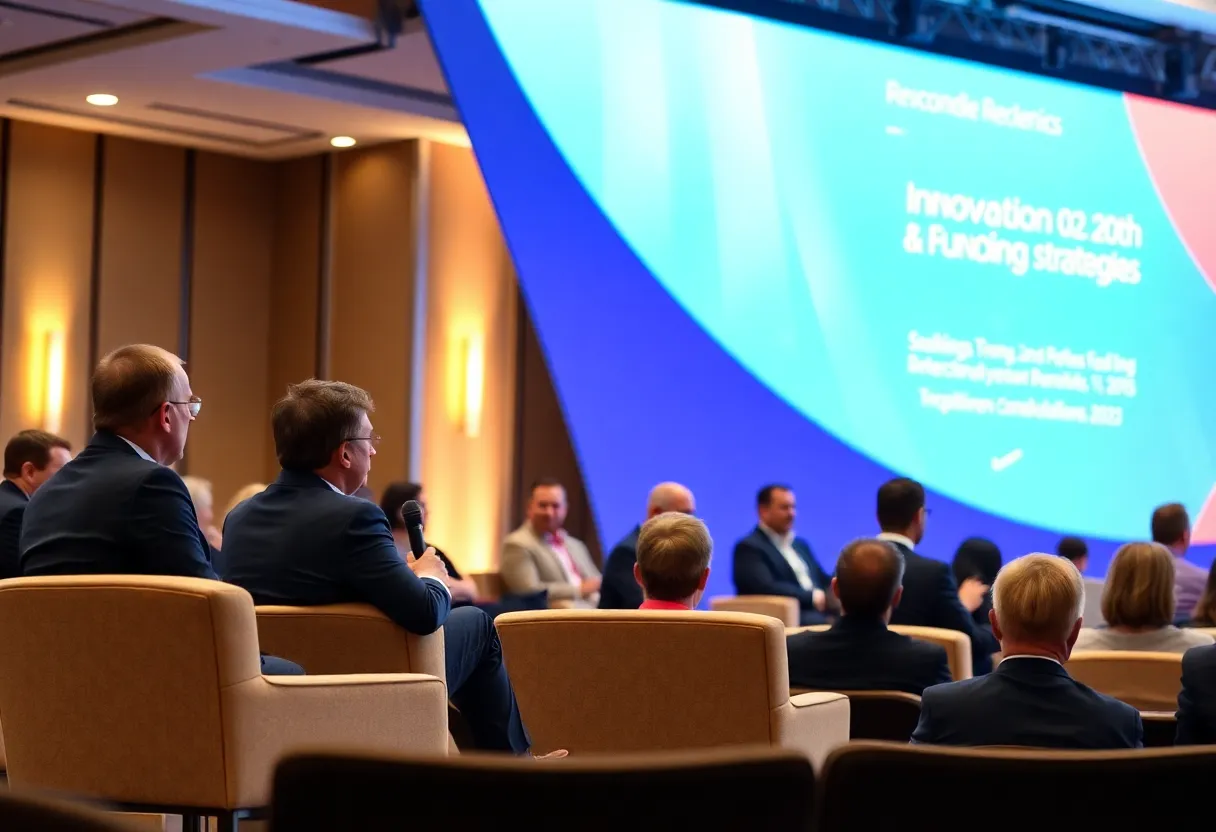Dallas, September 25, 2025
News Summary
The BioNTX iC3 Life Science & Healthcare Innovation Summit brought together Texas biotech leaders and investors to discuss funding challenges amid financial pressures. Speakers emphasized the need for immediate workforce initiatives and policy proposals to support biotech companies struggling with cash runways and an uneven funding landscape. The summit highlighted Texas’ local advantages and announced state measures aimed at bolstering workforce development and research funding for neurodegenerative diseases.
Dallas — The 2025 BioNTX iC3 Life Science & Healthcare Innovation Summit convened Texas biotech leaders and investors on September 16-17 amid mounting financial pressure across the sector. Organizers and speakers used the two-day event to outline immediate funding challenges, workforce initiatives, and policy proposals intended to help companies adapt to a capital-constrained environment.
Key facts and top takeaways
The 2025 BioNTX iC3 Life Science & Healthcare Innovation Summit was held on September 16-17 at the Hilton Anatole hotel in Dallas, Texas. Speakers at the summit included senior industry and policy figures such as the CEO of the Biotechnology Innovation Organization, a Texas state senator, and the CEO of the Texas Healthcare and Bioscience Institute. The summit emphasized that Texas biotechs face a difficult funding climate after a post-pandemic bear market and that financial resilience will be critical over the coming 12–24 months.
Federal and state funding dynamics, private investment trends, and regulatory timelines were central topics. The Texas edition of the EY Biotech Beyond Borders Report 2025 revealed that more than half of public biotechs in Texas have less than one year of cash and 25% have less than two years, highlighting acute runway risk for many local public companies.
Investment climate and industry pressure
Panelists identified several structural problems affecting biotech financing: a largely closed IPO window, lower M&A deal values driven by rising interest rates, and growing regulatory cost pressures. The CEO of the Biotechnology Innovation Organization described the traditional biotech funding model as broken, pointing to long development timelines, high costs, and regulatory inconsistencies that slow commercial progress and increase investor risk.
Competition from international markets also surfaced as a concern. Observers pointed to faster development timelines in some other countries, contributing to competitive pressure on U.S. companies. At the federal level, the National Security Commission on Emerging Biotechnology released a report recommending a $15 billion U.S. biotech fund and a network of biotech manufacturing hubs to strengthen domestic capacity and shorten supply chains.
Texas strengths and policy responses
Speakers and state leaders underlined several local advantages for North Texas firms, including Tier 1 universities, a skilled technical workforce, and a growing regional finance sector. State-level policy actions were presented as complementary supports: recently passed measures aim to expand training and workforce development for life sciences. In particular, recently passed state legislation, including Senate Bill 856, expands the Texas Skills Development Fund to support biotech workforce development.
Voters in the state will also see a public funding proposal that targets neurodegenerative disease research. Proposition 14 aims to establish the Dementia Prevention and Research Institute of Texas (DPRIT), creating a $3 billion fund for dementia, Alzheimer’s, and Parkinson’s research and treatment, a measure described at the summit as potentially transformative for disease-focused research capacity in Texas.
Science, AI and operational priorities
Panel sessions emphasized the scientific concentration in oncology and the potential for artificial intelligence to increase efficiency. The biotech industry was noted as a significant driver of targeted therapies, particularly for cancer, which constituted 40% of all clinical trials in Texas last year. At the same time, speakers highlighted AI’s role in accelerating discovery and regulatory review processes. Attendees pointed to market uptake as evidence of AI’s growing role in health care, noting that AI is seen as a promising avenue for bolstering life sciences, with more than 1,000 FDA-approved AI-enabled medical products already in the market.
Operationally, summit participants urged companies to focus on efficiency, adaptability, and pragmatic prioritization of programs with clearer regulatory paths or nearer-term value inflection points. Local infrastructure and campus developments, such as biotech activity around Pegasus Park and companies based in the Dallas area, were cited as practical anchors for recruiting talent and fostering collaboration.
What leaders stressed
- Shorter development timelines and lower costs are needed to restore investor confidence.
- Faster regulatory review and clearer guidance could unlock private capital and reduce uncertainty.
- State workforce programs and proposed research funds could support talent pipelines and specialized research projects.
Next steps and outlook
Summit organizers and participants signaled a steady push toward policy, investment, and operational changes aimed at stabilizing Texas biotech in the near term. Companies, investors and state officials were encouraged to coordinate on workforce training, targeted public funding, and regulatory engagement to address the combined challenges of limited cash runways and a difficult capital market.
FAQ
When and where was the summit held?
The 2025 BioNTX iC3 Life Science & Healthcare Innovation Summit was held on September 16-17 at the Hilton Anatole hotel in Dallas, Texas.
What did the Texas EY report reveal about cash runways?
The Texas edition of the EY Biotech Beyond Borders Report 2025 revealed that more than half of public biotechs in Texas have less than one year of cash and 25% have less than two years.
What is the state legislation mentioned that supports workforce development?
Recently passed state legislation, including Senate Bill 856, expands the Texas Skills Development Fund to support biotech workforce development.
What does Proposition 14 propose?
Proposition 14 aims to establish the Dementia Prevention and Research Institute of Texas (DPRIT), creating a $3 billion fund for dementia, Alzheimer’s, and Parkinson’s research and treatment.
What share of clinical trials in Texas were cancer-related last year?
The biotech industry is a significant driver of targeted therapies, particularly for cancer, which constituted 40% of all clinical trials in Texas last year.
What was said about AI and medical products?
AI is seen as a promising avenue for bolstering life sciences, with more than 1,000 FDA-approved AI-enabled medical products already in the market.
What federal recommendation was highlighted?
The National Security Commission on Emerging Biotechnology released a report recommending a $15 billion U.S. biotech fund and a network of biotech manufacturing hubs.
Key features and metrics
| Feature | Metric or example |
|---|---|
| Summit dates and location | The 2025 BioNTX iC3 Life Science & Healthcare Innovation Summit was held on September 16-17 at the Hilton Anatole hotel in Dallas, Texas |
| Cash runway risk (Texas public biotechs) | The Texas edition of the EY Biotech Beyond Borders Report 2025 revealed that more than half of public biotechs in Texas have less than one year of cash and 25% have less than two years |
| Cancer trial share (Texas) | The biotech industry is a significant driver of targeted therapies, particularly for cancer, which constituted 40% of all clinical trials in Texas last year |
| AI-enabled products | AI is seen as a promising avenue for bolstering life sciences, with more than 1,000 FDA-approved AI-enabled medical products already in the market |
| Federal recommendation | The National Security Commission on Emerging Biotechnology released a report recommending a $15 billion U.S. biotech fund and a network of biotech manufacturing hubs |
| State workforce law | Recently passed state legislation, including Senate Bill 856, expands the Texas Skills Development Fund to support biotech workforce development |
| Research funding ballot item | Proposition 14 aims to establish the Dementia Prevention and Research Institute of Texas (DPRIT), creating a $3 billion fund for dementia, Alzheimer’s, and Parkinson’s research and treatment |
Deeper Dive: News & Info About This Topic
HERE Resources
Finalists Announced for Southwest Tech Transfer Showcase
Additional Resources
- Dallas Innovates: The Model is Broken from North Texas
- Fierce Healthcare: Healthcare Conferences Calendar 2024-2025
- Bisnow: International Life Sciences Biotech Conference
- Bisnow: The Future of DFW Life Sciences
- Fierce Healthcare: Day 2 Healthcare Conference Coverage

Author: STAFF HERE DALLAS WRITER
The DALLAS STAFF WRITER represents the experienced team at HEREDallas.com, your go-to source for actionable local news and information in Dallas, Dallas County, and beyond. Specializing in "news you can use," we cover essential topics like product reviews for personal and business needs, local business directories, politics, real estate trends, neighborhood insights, and state news affecting the area—with deep expertise drawn from years of dedicated reporting and strong community input, including local press releases and business updates. We deliver top reporting on high-value events such as the State Fair of Texas, Deep Ellum Arts Festival, and Dallas International Film Festival. Our coverage extends to key organizations like the Dallas Regional Chamber and United Way of Metropolitan Dallas, plus leading businesses in telecommunications, aviation, and semiconductors that power the local economy such as AT&T, Southwest Airlines, and Texas Instruments. As part of the broader HERE network, including HEREAustinTX.com, HERECollegeStation.com, HEREHouston.com, and HERESanAntonio.com, we provide comprehensive, credible insights into Texas's dynamic landscape.



